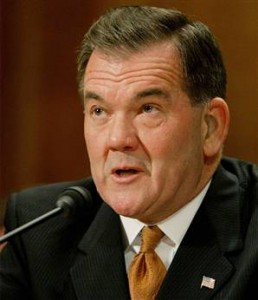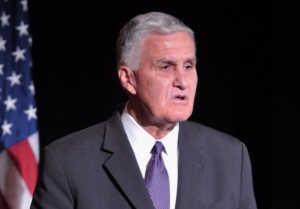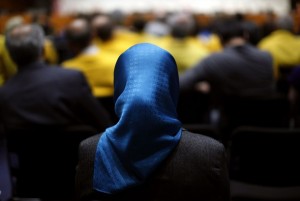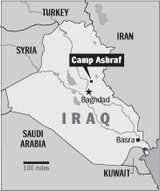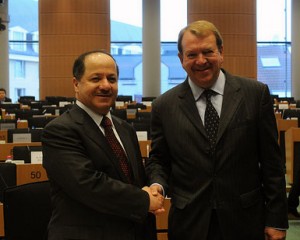THE BALTIMORE SUN
Stop calling MEK a terrorist group and let Iranians transform their own country
The International Atomic Energy Agency‘s latest report about Iran lays bare the true nature of Tehran’s nuclear agenda: an advanced, sophisticated and highly secretive program run by the Islamic Revolutionary Guards Corps to build the bomb.
Overwhelming evidence shows a pattern dating back many years of covert activities with significant military involvement that cannot be explained away for any purpose other than building a nuclear warhead. The report contradicts the Iranian regime’s claim that its nuclear program is for peaceful purposes. “Iran has carried out activities relevant to the development of a nuclear explosive device,” the IAEA report underscored.
For years, Tehran has been dribbling out information only when confronted, conceding the existence of nuclear sites only after they were exposed by Iran’s main opposition movement, the Mujahedin-e Khalq (MEK), and responding to IAEA inquiries only after the fact.
Speculation over what to do about Iran is the topic of the day, but the Iran policy conundrum was not ignited by this or previous IAEA reports, nor is it a matter only for Washington to decide. The West has been engaged in a policy debate for years, in the course of which Europe was pretty much given the lead to deal with Iran, but to no avail.
For three decades, Washington has acted like a pendulum, oscillating between engagement and threats of military action. Given the problematic nature of the latter, engagement has essentially held sway. This has provided the Iranian regime a golden opportunity to rapidly advance its quest for the bomb.
When the European Union started nuclear talks with Iran in 2003, Tehran had not even completed the construction of its only known uranium enrichment facility at Natanz, and it was not enriching uranium. By the time President Barack Obama was sworn in, Iran was already enriching uranium at 3.5 percent levels, thousands of centrifuges had been installed at Natanz, and work was proceeding at a number of nuclear sites.
When President Obama embarked on his campaign to unclench the fist of the ayatollahs and persuade Tehran to abandon its nuclear weapons program, Tehran’s apologists were cheering the anticipated results. Nearly three years later, Tehran is enriching up to 20 percent, is installing centrifuge machines in an underground uranium enrichment facility in Qom, has been experimenting and working on building nuclear warheads, and has enough enriched uranium to make four nuclear weapons, if further enriched to weapon grade.
The moral of the story is that engagement has failed to halt Tehran’s nuclear drive. Sanctions have proven patently insufficient. So can anything be done? The answer is yes.
The opposition MEK has been the source of much of the intelligence about the existence of multiple nuclear sites scattered in different parts of Iran, including the uranium enrichment facility in Natanz and the heavy water facility in Arak in 2002; the key nuclear research and development facility in Lavizan-Shian in 2003; the Qom underground enrichment facility in 2005; and other significant sites over the following years directly involved with nuclear weaponization.
Iran saw major uprisings in 2009 lasting several months before being brutally suppressed. Many MEK members were arrested, sentenced to death or hanged for organizing and/or taking part in the anti-government demonstrations.
Currently, Iran’s economy is in shambles, the ruling elite are increasing fighting among themselves and internal dissent has spread.
Little can be done to stop Iran from advancing its ambitious nuclear weapons program without factoring in the Iranian people and their organized opposition committed to replacing the regime with a democratic, secular and non-nuclear republic. This option has the support of a large, bipartisan group of members of Congress who are calling on the State Department to remove the terrorist designation of the MEK, placed on the movement 14 years ago as a goodwill gesture to Tehran. (Dozens of senior former officials of the Obama, Bush and Clinton administrations have made similar calls for delisting the MEK, including a national security adviser, a Homeland Security secretary, three chairs of the Joint Chiefs of Staff, directors of the CIA and FBI, a U.S. attorney general, U.S. ambassadors to the United Nations, and counter-terrorism officials.)
Nothing has been more destructive than engagement packaged under different names. Iran’s nuclear clock is ticking. However, there is no need for foreign governments to allocate money, dispatch troops or launch any kind of military action against Tehran.
This is the era of people power, arguably more deeply rooted in Iran than what we have seen in the Arab Spring. It is time for the West, the U.S. in particular, to focus on the third way: change from within, by relying on the people of Iran and their organized opposition movement.
Alireza Jafarzadeh is the author of “The Iran Threat: President Ahmadinejad and the Coming Nuclear Crisis.” He exposed the nuclear sites in Natanz and Arak in 2002, which triggered the IAEA inspections of the Iranian nuclear sites. His email is jafarzadeh@spcwashington.com.
http://www.baltimoresun.com/news/opinion/oped/bs-ed-iran-20111115,0,7202013.story
